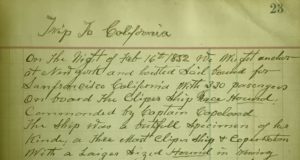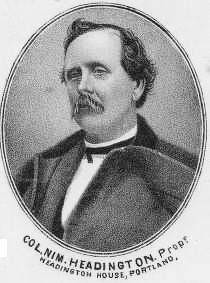Today, the third in a series of blog posts, the transcription the 1852 journal of Nimrod Headington, my fourth great-granduncle. [1]
Nimrod Headington (1827-1913), at the age of 24, set sail from New York in February 1852, bound for San Francisco, California, to join the gold rush and to hopefully make his fortune. The Panama Canal had not been built at that time and he sailed around the tip of South America to reach the California coast.
Nimrod Headington kept a diary of his travels and in 1905 he made a hand-written copy of his 1852 journal for his daughter Thetis O. Tate. This hand-written copy was eventually passed down to Nimrod’s great-great-granddaughter, Karen (Liffring) Hill (1955-2010), who was a book editor. During the last two years of her life she transcribed Nimrod’s journal, which documents his travels between February of 1852 and spring of 1853.
Today, the third installment of Nimrod Headington’s 1852 journal, “Trip to California.” Nimrod’s diary continues in Brazil, 39 days after sailing from New York:
BRAZIL
Thursday fine weather and good sailing in latitude 20°14’. We came in sight of the Brazilian Mountains. We amused ourselves by looking at them all day, as we had not seen land for 30 days.
These mountains are very high and can be seen a great distance from off the sea. The mountains are covered with low bushy trees. Thousands of wild cattle can be seen feeding in the mountains, by the aid of the spyglass, and all kinds of wild animals.
March 24. We came in sight of Rio, and the light at Rio de Janeiro. The wind grew so strong that we had to tack ship and stand out to sea because we could not reach the port before dark. No vessels are allowed to enter or depart from this port after the sun goes down.
The next morning it was almost a calm, but we headed for port. At four o’clock we passed the first Fort. They hailed us from the fort, saying, “Where are you from and how many days out?” Our captain answered, “From New York, 39 days out.” In five minutes one of the custom house officers was on board of our ship, and he ordered the captain to let go anchor or the second fort would fire into us. The captain paid no attention to the officer, and when we got opposite the second fort, they cried out, “Cast your anchor immediately!” The anchor was let loose. If it had not been done, they would have fired into our ship and perhaps sunk us, as the custom of this port is to allow no foreign vessel to pass the second fort without a special permit from the first fort and from the custom house office.
A guard boat is stationed halfway between the fort and the city to prevent passengers from landing or smuggling anything to or from our ship. The custom house officer examined the ship’s papers and inquired about the health of the passengers and crew and whether we had any sickness on board since we left the port at New York and if any had died. As we had only had one death and all was well, he left us well satisfied for us to land. But previous to our landing at this port, we had prepared a petition to the
American consul at this place, asking him to aid us in chartering another vessel to take part of our passengers, as we were suffering for want of room and ventilation.
As soon as the anchor was dropped, the captain gave orders that none of us should go ashore until the next morning. He thought to visit the consul first and arrange things to suit himself, but we beat his game easy, for we had some long heads in our crowd. About the time the sun set in the west and the shades of night set in, a small boat manned by two Portuguese came along the side of our ship, and without the knowledge of our captain, we lowered a man by the name of Abott from the state of Maine down into the boat by the aid of a rope and told the men to take him ashore as fast as possible. He was soon on shore and at the office of the consul armed with our petition setting forth our grievances. It being late Saturday evening, the consul told Mr. Abott to come to his office on Monday morning at ten o’clock, and at the same time he wrote a note for Mr. Abott to hand to our captain, and as the note was not sealed, he read it was a notice to the captain to appear at the same hour.
The next morning, Sunday, the captain was preparing to go on shore with his [lady] when Mr. Abott stepped up to him and handed him the note from the consul. Oh, but he was surprised! He asked Abott where he got the note and was told “at the office of the American consul.” He asked Abott if he had not seen his order that no one should go on shore until Sunday morning. Abott answered, saying, “Captain your ship is not laden with cattle, but with free-born American citizens, who have some rights that you are bound to respect.” [2]
To be continued, with more from Brazil…
I will post Nimrod’s journal in increments, but not necessarily every week.
[1] Nimrod Headington, the son of Nicholas (1790-1856) and Ruth (Phillips) (1794-1865) Headington, was born in Mt. Vernon, Knox County, Ohio, on 5 August 1827. He married Mary Ann McDonald (1829-1855) in Delaware County, Ohio, in 1849 and they had a son a year later. Nimrod moved to Portland, Jay County, Indiana, by 1860. He served in the 34th Indiana Infantry during the Civil War as a Colonel, Lieutenant Colonel, and Major. Nimrod died 7 January 1913 and is buried in Green Park Cemetery, Portland. Nimrod Headington is my fourth great-granduncle, the brother of my fourth great-grandfather, William Headington (1815-1879).
[2] Nimrod Headington’s journal, transcription and photos courtesy of Ross Hill, 2019, used with permission.





2 comments
Nimrod was quite the story teller and adventurer. When I reached the end of today’s story I was disappointed there wasn’t more. That’s how captivating the tale is. Thanks for sharing his adventures.
Author
You are right! He was a good storyteller and made the tales of his journey so very interesting. I am glad to hear you are enjoying it and there is much more to come. (A teaser: just wait until he gets to the California gold fields.) Thanks for writing!